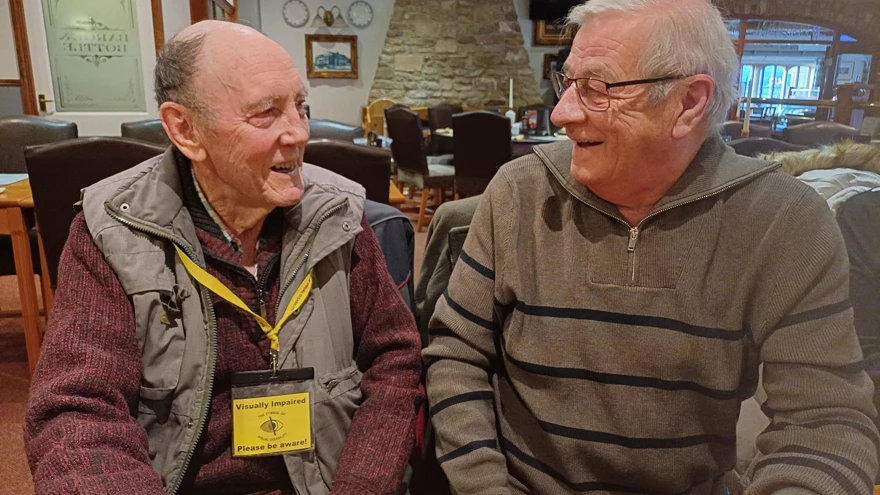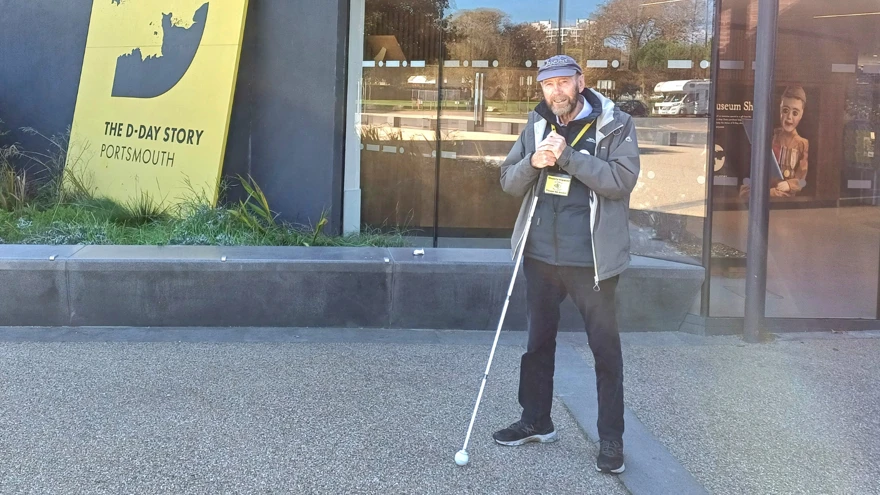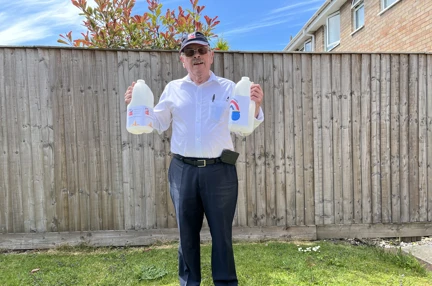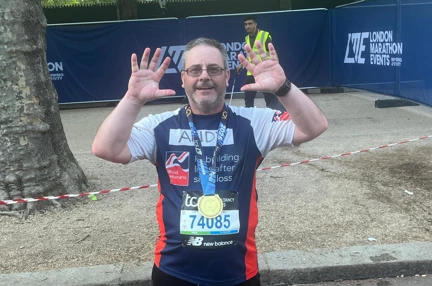The long white cane: "My tool for freedom"
On White Cane Safety Day, we’re sharing how encouragement from one veteran helped another find the confidence to take his first steps with a white cane - and regain his independence.
For many of our veterans adjusting to sight loss, picking up a white cane can be a difficult step. It can feel like a visible reminder that life has changed.
When Terry and Dave met at a Blind Veterans UK coffee morning, they found they had something in common. Both had served for decades, both lost their sight later in life through macular degeneration, and both had once thought: “That cane’s not for me.”
By then, Terry had already completed his long cane training. He knew what the first step felt like, and he encouraged Dave to try.

Terry: “I didn’t want people looking at me differently.”
Terry spent 22 years serving with the Royal Green Jackets, and struggled to come to terms with his sight loss diagnosis.
"I was diagnosed with age-related macular degeneration, and everyday things - making a cup of tea, crossing the road - became so frustrating."
When his Community Support Worker suggested long cane training, Terry resisted. “I thought, ‘That’s not for me.’ I didn’t want people looking at me differently.” With encouragement from his wife, he gave it a try.
“I was petrified. I was used to holding onto someone’s arm. With the cane, suddenly I had nothing to lean on, and I panicked.”
But the next day, something clicked:
“I started thinking about Army drill movements. The cane goes right, your left leg moves forward. It’s like swinging your arms in drill. I could feel the surface I was on, sense obstacles ahead. And then I realised - I was free. I didn’t have to rely on anyone anymore.”
Now, Terry calls the cane his 'tool for freedom.' At the coffee morning, Dave mentioned his hesitations to Terry:
“I told him, ‘That was my attitude, mate. But once I got my cane, it opened everything up. There’s no shame in it - far from it. It gives you your independence back.’”
“I used to sit indoors and mope, but now I’ve got my cane, nothing stops me - I’m off!”
Dave: “I thought it wasn’t for me"
That conversation stuck with Dave. He'd been managing without a cane, but not without difficulty.
Dave, who spent more than 30 years in the RAF as a pilot and air traffic controller, had also been diagnosed with macular degeneration.
“My sight loss has been gradual, so I felt that I was managing. I thought it wasn’t for me, that I wasn’t ready for it. But as my vision worsened, even simple things like pouring a cup of tea tea or cooking were becoming a challenge.”
“Terry told me he’d felt the same way, but now he wouldn’t be without it. We come from similar service backgrounds, so his words stuck with me.”
Encouraged by Terry, Dave went on to complete long cane training at our Rustington Centre, followed up at home with support from our Rehabilitation Officers for Visually Impaired (ROVIs). He picked up the technique quickly and now uses his cane every day, indoors and out.

"My long cane has helped me move with confidence."
Dave’s confidence has grown steadily. He can now move independently inside and outdoors - steady, safe, and finding that he actually benefits from the visibility his cane gives him.
Recently, Dave joined two week-long sailing trips and loved every minute. He still attends the Sleaford social group, staying connected with other blind veterans. But now the roles have reversed: where Terry once encouraged him, Dave is the one checking in on others and offering advice.
"People do respect it"
In this short clip, hear blind veteran Dave share how using a long cane has made him more visible, more confident and more independent.
Why it matters
For blind veteran Dave, his white cane changed how he moved through the world - and how the world moved around him.
The white cane gives people with sight loss confidence, safety and visibility. If you'd like to understand more about how white canes support independence and how they're used, explore our guide.
More news
A Sandhurst Celebration
16 Feb 2026
A group of blind veterans joined charity corporate partners at a special event held at RMA Sandhurst.

‘Every Penny Counts’ update
5 Feb 2026
A blind veteran has raised over £1,000 in 18 months by collecting pennies in an old milk bottle.

200 miles a month resolution
3 Feb 2026
A blind veteran has set himself a resolution in 2026 to run or walk 200 miles a month to support our charity.

Sign up for email updates
We would love to keep you updated about our activities, services and ways to support us.
You can change your contact preferences at any time by calling us on 0300 111 2233 or emailing us. See our privacy policy for more details.
